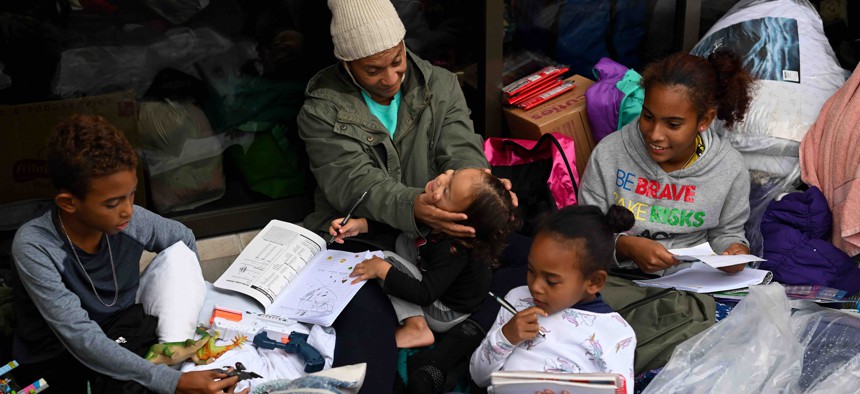Policy
Blue state governors pressing Biden administration to help with migrant surge
Illinois Gov. J.B. Pritzker is the latest to outline policy changes the feds could make to alleviate some of the strain on states, cities.

Migrant mother Marioxi Leon (wearing hat), who is living at the Chicago Police Department's 15th District with her kids sits with her family outside the station in September. Since last year, over 14,000 migrants, mostly from Venezuela, have arrived in Chicago by bus from the Texas border. Joshua Lott/The Washington Post via Getty Images
Under pressure to ease the strain an influx of migrants has put on state and local resources, the Biden administration announced in recent days it would resume construction of a Trump-era border wall and deportations of migrants to Venezuela.
But state and local officials are also asking the administration to make several lower profile changes that could improve their response to the humanitarian crisis.
Illinois Gov. J.B. Pritzker, for example, recently sent a letter asking President Joe Biden to designate a single person in the White House to coordinate the federal response to new migrants. Pritzker, a Democrat, also asked Biden for better logistical and financial support for states.
Related coverage –
- New York City council speaker: City is ‘running out of room’ for migrants
- State of Florida defends its immigration law
- Biden's immigration policies are working, officials say – though workforces are stretched thin
“There is much more that can and must be done on a federal level to address a national humanitarian crisis that is currently being shouldered by state and local governments without support,” Pritzker wrote.
His plea for help comes after the governors of Massachusetts and New York have raised similar requests.
Massachusetts Democratic Gov. Maura Healey has already sent two letters to Homeland Security Secretary Alejandro Mayorkas calling for help from the federal government. Healey, along with top state legislative leaders, met with the Massachusetts congressional delegation this week to outline the state’s requests. “We need two things from the Biden administration: We need federal funding, and we need expedited work authorizations,” Healey said.
In New York, both Gov. Kathy Hochul and Mayor Eric Adams have very publicly blamed the federal government for the crisis.
Last week, the New York Association of Counties asked Senate Majority Leader Chuck Schumer to make changes in federal law that would allow school districts to get additional federal funding in places where there has been a significant increase in migrants.
To do so, they called for an expansion of “impact aid” that the federal government provides to help educate children living on Indian lands, military bases, low-rent housing properties and other federal properties.
The impact aid for migrants, the county leaders said, should be given to cities, counties, school districts and other local governments that have significant migrant-related expenses.
“Until such time that the federal government resolves this federally created crisis, this is one way that Congress can provide sufficient resources on a formula basis to all communities impacted by the federal lack of action to date. Local taxpayers and communities should not be left alone in handling this responsibility,” they wrote.
Little chance of help from Congress
With Congress in disarray, there’s little prospect of any major changes to immigration law in the near future. As a result, much of the focus is on what the Biden administration can do on its own to alleviate the crisis, which is caused, in part, by long federal backlogs in the processing of asylum applications.
The current wave of migrants is different from previous influxes of newcomers because many of them are fleeing en masse from failed states or threats of violence. That makes them potential candidates for asylum. But getting asylum in the U.S. is not a straightforward process.
The applicants have to show they have a legitimate fear of violence or prosecution if they return home. Depending on their situation, they can ask for asylum either through U.S. Citizenship and Immigration Services or through immigration courts.
But the backlog of USCIS applications has grown to record highs (with 842,000 cases pending) and asylum applications are now expected to take nearly a decade to process. One issue is that 96% of funding for USCIS comes from fees paid by immigrants or by companies and U.S. citizens who sponsor those immigrants.
That means that, unless Congress decides to provide more funding, the only way to pay for more employees to process asylum applications is to raise fees on people seeking green cards or other immigration benefits.
Likewise, the immigration court system also faces record backlogs, with more than 2 million pending cases. The system handles many kinds of immigration-related matters, but, as of earlier this year, some 750,000 asylum applications were waiting to be heard by immigration judges.
Meanwhile, asylum seekers are prohibited by federal law from working for at least six months after coming to the country. That means people arriving in Boston, Chicago or New York cannot get jobs to pay for their own shelter for several months.
They have to wait until they qualify for work authorization, and then they have to wait to get federal approval. Getting work authorization is a separate process from applying for asylum, but getting approval to work can still take nearly six months.
The Biden administration has taken several measures to address those concerns. For example, it extended the time an initial work permit is valid for asylum seekers from two years to five years. That could cut out hundreds of thousands of applications for federal agencies to handle every year and allow them to divert resources toward cutting the backlogs.
'TPS' extended for Venezuelans
In late September, the administration extended temporary protected status, or TPS, for Venezuelans in the U.S. as of July 31. The move clears the way for as many as 470,000 Venezuelans to work here legally.
In his letter, Pritzker said he was “grateful” for the move but still had concerns about how it would be carried out. He asked Biden to waive the TPS application fees, which can cost more than $500. The Illinois governor also said he’s worried that the people applying for work authorization under the program would still have to wait six months for approval.
“We ask that the White House and the administration continue to look for ways to ‘cut the red tape’ and speed up the work authorization process by all means necessary, including instituting a mass fee waiver,” Pritzker wrote.
He also requested a single federal contact on migrant issues, echoing a recommendation the American Immigration Council made in May.
Aaron Reichlin-Melnick, the immigration council’s policy director, explained that there are several federal agencies that play a role in a migrant’s journey. The Border Patrol tries to prevent illegal immigration near the borders. Inside the country, the main agency is Immigration and Customs Enforcement.
Those two agencies are both part of the Department of Homeland Security. But the immigration courts that determine the fate of asylum seekers and other immigrants are under the Justice Department.
The federal agencies “are doing a lot better job internally coordinating than they were five to 10 years ago—especially on the border—but they’re still not doing a significantly better job of coordinating with local governments,” Reichlin-Melnick said.
But a federal coordinator could improve the ability of state and local governments to respond, he said. For example, the Border Patrol collects information from migrants about where they intend to go after they are released from custody. That’s information the agency could share with state and local officials to let them know how many people to expect, he explained.
A centralized office would also be able to spot problems that states, local governments and nonprofit service providers are having and provide a broad solution. For example, Reichlin-Melnick said, many providers getting reimbursements from the Federal Emergency Management Agency for providing shelter worry that they will lose funding for typos in the paperwork they submit documenting which migrants they are serving.
Need for centralized migrant office?
That kind of concern might get lost if it’s handled on a case-by-case basis with officials in local field offices. They’re not seeing the same sense of urgency as would “one person who was getting reports from 30 different places about this concern,” he said.
On a broader level, a centralized migrant office could help better coordinate where migrants go once they cross the border.
“The destinations that the buses go to are chosen by Texas, but the decision to get on a bus and go to a specific location is made by the migrants,” Reichlin-Melnick said. “And it’s usually made by people who are out of money. They’ve spent every single penny they had to get to the border and to cross and now … they find themselves in El Paso or Del Rio, Texas, with no money and a dream of getting to somewhere safer like New York and no way to do it. And then here comes along Texas and says, ‘Hey, here’s a free bus. You can get on it. We’re heading to New York.’”
But federal coordination could help give migrants more options. “There are a lot of places around the country right now that are desperate for people to move there,” he said. “They need workers.”
Those places might be willing to host 10-20 migrants for a few months while they wait to get work authorization, Reichlin-Melnick said.
Pritzker said it was unfair to leave it up to the states to determine where migrants could go after they got to the U.S..
“As just one state in our union, we cannot lead coordination efforts at the border,” the governor told Biden. “It is time for the federal government to take a much more active role in managing the transport and destination of the transport of asylum seekers.
“Our nation is large and resourceful. Allowing just one state to lay the burden upon a certain few states run by Democrats is untenable. We are a nation that has welcomed immigrants and refugees since our founding, and we have done so in a bipartisan manner. It cannot be that just a few cities and states should now bear the cost of this effort alone.”
Daniel C. Vock is a Washington, D.C.-based senior reporter for Route Fifty, where this story was first published.
NEXT STORY: Abortion initiative tops 400,000 signatures in Florida
